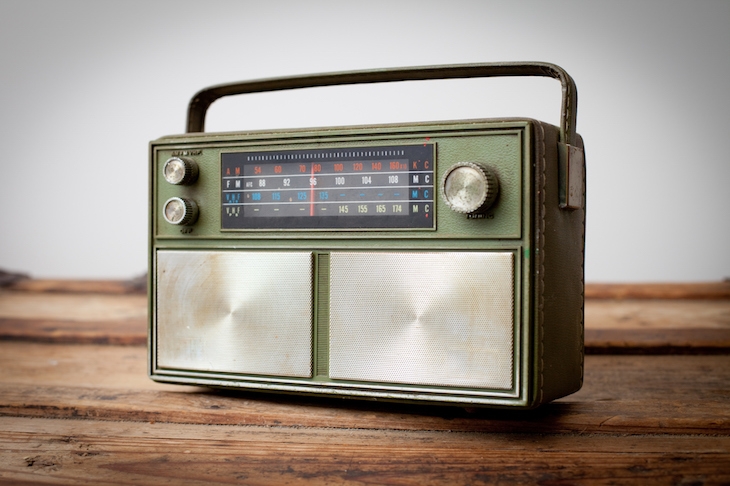As Bob Shennan, the BBC’s director of radio and music admitted this week, there are almost two million podcast-only listeners in the UK who never tune into BBC Radio. They’re captivated by specialist music (Heart, Absolute, etc), specialist talks (mostly religious such as Premier Christian) or specialist news and current affairs (the Economist, Monocle). And they never feel the need to cross over into Auntie’s sphere of influence. The BBC’s response, says Shennan, must be to produce ‘a revitalised audio product’ to meet the needs, or rather demands, of these new audiences.
‘Audio product’ seems a long way from Music While You Work or Down Your Way. Soon, Shennan envisages, most listeners will be using voice apps to order up what they want to listen to from a vast range of programming, sometimes from what are now called ‘linear’ (i.e. traditional scheduled) stations by switching on (or tuning in) in the old-fashioned way, at other times by dipping into preselected podcasts, or streaming from the web, or maybe resurrecting something from the ‘deep archive’.
More intriguing was Shennan’s admission, in the same speech, that the UK (unlike Norway) is still not ready to switch off analogue and go digital-only, at first planned for 2015, then put off until 2017, and now receding, as DAB sets begin to look more and more like cassette-players or video-recorders. There’s no need now (or at least not for the foreseeable future) to junk that old Roberts set in the kitchen, its loudspeaker muffled under layers of grease, flour and icing sugar. It still gives the best signal (DAB has never worked properly in my area).
On Sunday night it gave me the rasping, haunting sound of the Revd Gary Davis, blues singer from the Deep South, who was featured in Gary O’Donoghue’s programme for Radio 3, Blind, Black and Blue (produced by Lee Kumutat and a team of blind editors and technicians). The BBC’s Washington correspondent and blind himself, O’Donoghue has always wondered why so many blind and black musicians achieved such celebrity in the first decades of the last century, leaving an indelible mark on American music and beyond. Many of them were blind because of illnesses as children, such as conjunctivitis or lack of vitamin A, which went untreated because black people did not have access to medical care.
They grew up poor and uneducated, under the rigid segregation imposed by the Jim Crow laws, which made the lives of those who were black and blind extra difficult (how could they know they were in the wrong part of town?), but taught themselves to play music that resonated way beyond their own lives. Blind Willie McTell, for instance, is celebrated in one of Bob Dylan’s most famous songs, while Davis played alongside Dylan at the Gaslight Cafe on MacDougal street in Manhattan, the blues influencing the folk revival with songs like ‘I’ve got fiery fingers,/ I’ve got fiery hands,/ And when I get up in heaven/ Gonna join that fiery band.’
The tell-it-all style of Sophie Willan’s Guide to Normality on Radio 4 (produced by Suzy Grant) comes from the same source, although it is very different in tone. She grew up in a chaotic family, often in care because her mother suffers from drugs-induced psychosis. Rather than lamenting her fate, she’s turned to stand-up comedy as a release, a way of telling. And precisely because she has never been able to take anything for granted, she’s well qualified to make her audiences sit up and think differently about themselves. Willan’s raw reality check is a refreshing blast from someone who’s definitely not had it easy but has not an ounce of self-pity.
This week’s Lent Talks, also on Radio 4 (produced by Rosie Dawson), gave us a shocking story, told in such a deadpan, matter-of-fact way it lingered in the mind. What was the effect of such an experience? Did she really bury it for years? Dr Katie Edwards, who now teaches biblical studies at Sheffield University, began by explaining that she has always been confused by ‘the silence of Jesus’. Why didn’t he speak out? Why was she always taught that silence, particularly in the face of adversity and abuse, is a strength, a virtue?
She then told us about an experience she shared with her schoolfriends when they were young teenagers. Befriended at the ice rink by a group of young men in their early twenties, they went to a party organised by them. They didn’t tell their parents. Why would they? To them, the men were funny, kind, romantic. But as soon as they arrived at the party, there was, recalls Edwards, a different atmosphere. She felt a sense of dread so strong she began to feel sick and could not swallow the drink they were all given. That saved her from the worst experience.
Her friends, who passed out, drugged by the drink, were raped. She was held down, her arm broken. No one ever spoke about it afterwards or told anyone about it. Her broken arm was explained away as an accident at the ice rink. ‘It never occurred to them to tell anyone what had happened. They knew they wouldn’t be believed.’






Comments